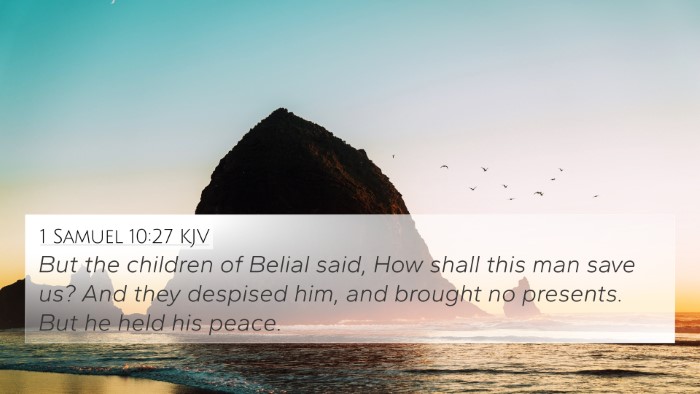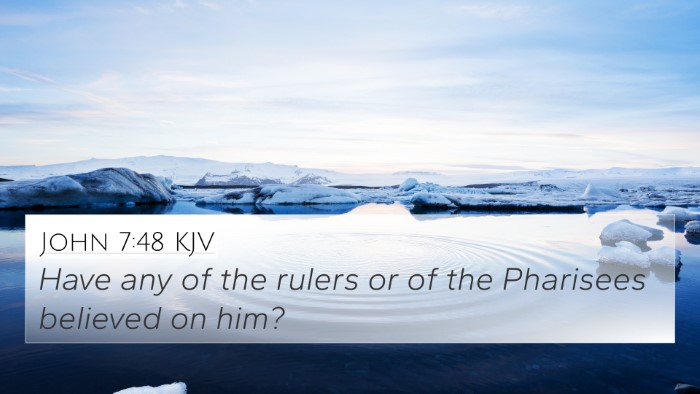Understanding Proverbs 11:12
Proverbs 11:12 states: "He that is void of wisdom despiseth his neighbour: but a man of understanding holdeth his peace." This verse encapsulates the importance of wisdom and understanding in human relationships, emphasizing how one's attitude towards others can reflect their inner character.
Summary of Proverbs 11:12
This verse compares the behavior of a foolish person with that of someone wise. The fool, lacking wisdom, tends to scorn or look down upon their neighbor, demonstrating a lack of regard for others. In contrast, a wise person exercises restraint and self-control, choosing to remain silent rather than engage in strife or disrespect.
Commentary Insights
- Matthew Henry: Henry emphasizes that wisdom is not merely intellectual but has a moral dimension. A wise person recognizes the worth of others and chooses to treat them with respect rather than contempt.
- Albert Barnes: Barnes points out that understanding leads to peace. The ability to hold one's peace, especially in contentious situations, reflects maturity and emotional intelligence, which are marks of true wisdom.
- Adam Clarke: Clarke conveys that the wise person understands the importance of relationships and the impact of their words. He suggests that silence can often speak louder than words, and sometimes it is better to refrain from commenting.
Thematic Connections
This verse connects with various biblical themes and other scriptures that speak to the importance of wisdom, the value of understanding, and the treatment of neighbors.
Related Bible Verses
- Proverbs 14:29: "He that is slow to wrath is of great understanding: but he that is hasty of spirit exalteth folly." This verse reinforces the connection between patience and wisdom.
- James 1:19: "Wherefore, my beloved brethren, let every man be swift to hear, slow to speak, slow to wrath." This New Testament verse mirrors the sentiment of Proverbs 11:12 regarding the importance of listening and restraint.
- Proverbs 10:19: "In the multitude of words there wanteth not sin: but he that refraineth his lips is wise." This passage echoes the notion that wisdom often involves knowing when to speak and when to be silent.
- Proverbs 12:18: "There is that speaketh like the piercings of a sword: but the tongue of the wise is health." Here, the contrast between damaging words and the healing nature of wise speech is clearly articulated.
- Proverbs 18:2: "A fool hath no delight in understanding, but that his heart may discover itself." This distinguishes the mindset of foolishness versus wisdom.
- Proverbs 15:1: "A soft answer turneth away wrath: but grievous words stir up anger." This verse highlights the results of different approaches to communication, emphasizing the value of a gentle response.
- Proverbs 19:11: "The discretion of a man deferreth his anger; and it is his glory to pass over a transgression." This reinforces the virtue of self-control and the wisdom of forgiveness.
Cross-Referencing Biblical Texts
Understanding Proverbs 11:12 can be enriched by exploring these cross-references. These verses collectively underline key biblical themes such as restraint, wisdom in communication, and the treatment of others.
Tools for Bible Cross-Referencing
When studying scriptures like Proverbs 11:12, it can be beneficial to use tools like:
- Bible concordance
- Bible cross-reference guide
- Cross-reference Bible study books
- Bible reference resources available in various translations
Conclusion
Proverbs 11:12 serves as a vital reminder of the relationship between wisdom and interpersonal conduct. By cultivating understanding and honoring our neighbors with respect, we fulfill the teachings of scripture that call us to live out our faith through our interactions with others. The practice of cross-referencing additional biblical texts helps to deepen our understanding and provides a fuller context for the wisdom presented in this verse.














